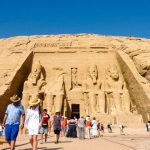Tips for Tourists in Egypt: Cultural Etiquette and Safety Advice
it’s important for visitors to be aware of cultural etiquette and safety advice to ensure a safe and enjoyable trip. Here are some tips to keep in mind when traveling to Egypt.
Tips for Tourists in Egypt: Cultural Etiquette and Safety Advice
Dress Code:
Egypt is a conservative Muslim country, and visitors should dress modestly, especially when visiting religious sites. Women should cover their shoulders and knees and wear loose-fitting clothing that doesn’t draw attention. Men should avoid wearing shorts and sleeveless shirts in public.
Respect Local Customs:
Egyptians are friendly and welcoming people, and visitors are encouraged to respect their customs and traditions. When entering a mosque, shoes should be removed and women should cover their heads. It’s also important to be aware of the different customs around greeting people, especially of the opposite sex.
Be Mindful of Photography:
Egypt is a photogenic country, but it’s important to be aware of photography etiquette. It’s forbidden to take pictures of military installations, police stations, and airports. Additionally, always ask for permission before taking someone’s picture, especially women and children.
Money and Tipping:
The currency in Egypt is the Egyptian Pound (EGP), and it’s important to carry small notes and coins for tips and small purchases. Tipping is a common practice in Egypt, and it’s customary to tip waiters, hotel staff, and tour guides. A general rule of thumb is to tip 10% of the bill.
Transportation:
Egypt has a variety of transportation options, including taxis, buses, and trains. It’s important to agree on a fare before getting in a taxi, and always use licensed taxis. It’s also recommended to book transportation through reputable companies or hotels, especially when traveling long distances.
Safety Precautions:
Egypt is a generally safe country, but visitors should still take precautions to ensure their safety. It’s important to avoid areas with large crowds, and to be aware of pickpockets in tourist areas. It’s also recommended to carry a copy of your passport and keep valuables locked in a safe or hotel room.
Cultural Sensitivity:
Visitors should be aware of cultural sensitivities when traveling in Egypt. It’s important to be respectful of local customs, such as avoiding public displays of affection, and not drinking alcohol in public. Additionally, it’s important to be aware of local laws and regulations, such as not importing drugs or engaging in illicit activities.
Egypt is a country that is rich in culture, history, and ancient wonders. It’s a popular destination for tourists from all over the world, and for good reason. From the stunning pyramids of Giza to the tranquil waters of the Nile, there’s something for everyone in this remarkable country. However, as with any foreign destination, it’s important to be aware of the local customs and etiquette, as well as to take necessary safety precautions to ensure a safe and enjoyable trip.
Language:
While many Egyptians speak English, it’s always helpful to learn a few Arabic phrases, as this can help to establish a connection with locals and show respect for their culture. Some useful phrases include “shukran” for thank you, “sabaah al-khayr” for good morning, and “masa’ al-khayr” for good evening.
Food and Water:
Egypt has a rich culinary culture, with many unique and delicious dishes to try. However, it’s important to be mindful of food and water safety to avoid getting sick. It’s recommended to drink bottled water and to avoid tap water, ice cubes, and uncooked fruits and vegetables that may have been washed with tap water. Additionally, it’s important to be aware of food hygiene practices, such as only eating at clean and reputable restaurants.
Bargaining:
Bargaining is a common practice in Egypt, especially when shopping at markets and bazaars. However, it’s important to approach bargaining with respect and patience. It’s recommended to start by offering a lower price and gradually working up to a mutually agreeable price. Additionally, it’s important to be aware of the value of items and to avoid being swindled by unscrupulous vendors.
Haggling:
Haggling is a common practice in Egypt, especially when shopping at markets and bazaars. However, it’s important to approach haggling with respect and patience. It’s recommended to start by offering a fair price and gradually working up to a mutually agreeable price. Additionally, it’s important to be aware of the value of items and to avoid being swindled by unscrupulous vendors.
Health and Medical Care:
Egypt has both public and private medical facilities, but it’s important to have adequate travel insurance and to carry any necessary medications with you. It’s also recommended to visit a travel health clinic before your trip to ensure that you are up-to-date on any necessary vaccinations or precautions.
Public Behavior:
Egypt is a conservative country, and visitors should be mindful of their behavior in public. For example, it’s considered impolite to eat, drink, or smoke in public during the month of Ramadan. It’s also important to be mindful of your surroundings and to avoid any behavior that may be considered disrespectful or offensive.
Gender Roles:
Egypt is a conservative country, and visitors should be mindful of gender roles and expectations. For example, it’s considered impolite for men to stare at women or make unwanted advances, and women may feel more comfortable dressing modestly to avoid unwanted attention.
Look here;Best Mosques in Egypt
Respect for Historical Sites:
Egypt is home to some of the world’s most famous historical sites, including the Pyramids and the Valley of the Kings. It’s important to show respect for these sites by not touching or climbing on the structures, and by following any posted rules or regulations.
Scams:
Tourists in Egypt may be targeted by scams, including fake tour guides, overpriced goods, and misleading information. It’s important to be cautious and to use reputable tour companies and guides. It’s also recommended to research common scams and to be wary of any offer that seems too good to be true.
Currency Exchange:
Egypt has its own currency, the Egyptian Pound (EGP), and it’s important to exchange money at reputable exchange bureaus or banks. It’s also recommended to carry small bills for tipping and for making small purchases.
Political Demonstrations:
Political demonstrations and protests can occur in Egypt, and visitors should be aware of any potential risks and avoid large gatherings. It’s recommended to stay informed of local news and to avoid discussing politics with strangers.
Greetings:
Egyptians are known for their warm hospitality and friendly demeanor, and it’s important to reciprocate these positive attitudes. It’s recommended to greet locals with a smile and a friendly “salam alaikum” (peace be upon you), and to use proper titles and honorifics when speaking with elders or authority figures.
Look here: Egypt Travel Tips 2023
Smoking:
Smoking is widely accepted in Egypt, but it’s important to be mindful of non-smokers and public smoking laws. It’s recommended to ask permission before smoking in public and to avoid smoking in enclosed spaces such as restaurants and hotels.
Religious Sites:
Egypt is a predominantly Muslim country, and visitors should be respectful of local customs and religious practices. It’s recommended to dress modestly when visiting mosques and other religious sites, to remove shoes before entering, and to avoid visiting during prayer times unless you’re there to pray.
Ramadan:
Ramadan is a holy month for Muslims in which fasting is observed from dawn to sunset. Visitors to Egypt during this time should be respectful of local customs and refrain from eating, drinking, or smoking in public during the day. It’s also recommended to dress modestly and avoid loud music or public displays of affection.
Look here: Ancient Egyptian Queens
Street Food:
Street food is a popular and delicious option in Egypt, but it’s important to be mindful of food safety and hygiene. It’s recommended to choose food from busy and popular vendors, to avoid raw or undercooked meat, and to drink bottled water.
Visa and Travel Insurance:
Visitors to Egypt require a visa, which can be obtained from the Egyptian embassy or consulate in your home country or on arrival at the airport. It’s recommended to purchase travel insurance that covers medical expenses and trip cancellations.
Safety:
While Egypt is generally a safe destination, it’s important to take precautions to avoid crime or accidents. It’s recommended to keep valuables secure and avoid displaying wealth, to use licensed taxis and drivers, and to be aware of potential scams or pickpocketing in tourist areas.
How then can we make tourism in Egypt safer?
There are several ways to make tourism in Egypt safer:
- Strengthen Security Measures: The Egyptian government can increase security measures in popular tourist areas, such as deploying more police officers and security personnel to monitor and patrol these areas. This can help to deter criminal activity and provide tourists with a greater sense of security.
- Improve Infrastructure: The government can invest in improving infrastructure in popular tourist destinations, such as roads, transportation systems, and public facilities. This can help to make these areas more accessible and safer for tourists.
- Enhance Emergency Response Services: The government can also improve emergency response services, such as ambulance and medical services, to ensure that tourists can receive prompt medical attention in case of an emergency.
- Promote Cultural Awareness: Tourists should be provided with information on the cultural norms and customs of the country, and advised on appropriate dress and behavior. This can help to avoid misunderstandings and conflicts that may arise from cultural differences.
- Educate and Train Tourism Workers: It is important to educate and train tourism workers, such as hotel staff and tour guides, on how to handle emergency situations and ensure the safety of their guests.
- Encourage Responsible Tourism: Encouraging responsible tourism can help to minimize negative impacts on local communities and the environment. This can be achieved by promoting sustainable tourism practices, such as reducing waste and conserving resources, and encouraging tourists to respect local cultures and traditions.
By implementing these measures, the Egyptian government can help to make tourism safer and more enjoyable for both tourists and local communities.








